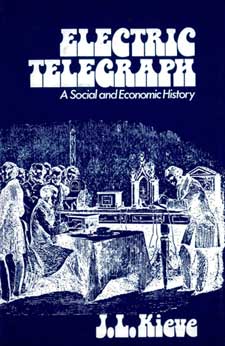History of the Atlantic Cable & Submarine Telegraphy (original) (raw)
Introduction: When I began research for the Atlantic Cable website in the 1990s, it was obvious that I would eventually need a large reference library. As well as books about the Atlantic cable itself, I found others describing important aspects of telegraphy, both landline and undersea. Many were technical; a few provided a broader view of the impact of the industry on society and business.
One of the latter was Jeffrey Kieve’s “The Electric Telegraph”, which covered the entire history of British telegraphy, from Cooke and Wheatstone’s early systems up until the time of the publication of the book in 1973. Even then, telegrams were still an important means of domestic and international communication (with Telex systems having replaced Morse Code decades before), and modern undersea telephone cables, while having been in service for just 17 years, were already showing signs of the beginnings of the digital age which led to the great expansion of the Internet and the creation of the World Wide Web in 1989.
My late friend and colleague Steven Roberts, whose Distant Writing website is a key reference for the development of the landline telegraph system in Britain from both a technical and business standpoint, notes in his 2006 introduction to the site that his research “...was inspired, as long ago as 1973, by the work of the late Jeffrey Kieve, whose pathfinding work opened the eyes of many to the commencement of our electronic age.”
In June 2020 I was very pleased to receive an email from Mildred “Millie” Kieve, offering to make her husband’s book, now long out of print and hard to find, freely available in digital form for the benefit of researchers and readers. Millie’s notes on the book are below, together with extracts of reviews from when it was first published, and a link to download a searchable PDF file of the full text.
When quoting from the book, please cite as:
“Kieve, Jeffrey L. The Electric Telegraph: A Social and Economic History. Newton Abbott, David & Charles, 1973.”
Millie Kieve writes:
For a long time, ever since my husband, Jeffrey Kieve, died in 2001, I have wanted to make his classic book, “The Electric Telegraph: A Social and Economic History,” available free for research and general interest. The story is fascinating, and as Jeff stated in his Author’s Notes, the book is not technical but a social and economic overview, therefore not too complicated for the lay reader.
Jeff’s discovery of the amazing treasure trove of information in the Post Office Records Office was an exciting find for him. With the help of Mrs McNamara who worked there at the time, he pulled down boxes covered in thick dust to find original correspondence handwritten by Cooke or Wheatstone. Jeff found letters with handwriting not only covering each sheet of paper, but up, down and around the sides, as well as across the pages, which was not always easy to decipher.
I am very grateful to Bill Burns in New York, and to Tom Horgan in Kerry, Ireland, who introduced me to Bill, for helping me in this task to honour the memory of my dear husband, Jeffrey Kieve. On behalf of myself and our three sons, Mark, Paul and Daniel, we wish you happy and enjoyable reading. You have our permission to quote from or reference the book as you wish.
Download The Electric Telegraph: A Social and Economic History (7MB PDF)
Quotes from reviews of the book:
The Economist, 3 February 1973
This is a valuable book, meticulously researched and carefully assembled.
It should appeal to those interested in the controversies over developing new technologies with private capital and public funds … and those who enjoy a sense of deja vu.
Times Literary Supplement, June 1973
Jeffrey Kieve’s book is the first comprehensive account of the developments and use of the electric telegraph….(it) gives a well-balanced account … marshalling a wealth of statistical evidence to give precision to his findings. His carefully researched and well illustrated book fills a big gap in our knowledge of British economic and social life in modern times.
New Statesman, 27 April 1973
Mr Kieve is strong on the economic side of his particular story, a story of public parsimony as much as of private enterprise.
Evening Standard, 13 February 1973
Mr Kieve … traces the history of the telegraph…and shows how scientific novelty became the nervous system of industry and commerce …
Jeffrey and Mildred Kieve and family in 1973
Photograph by Ken Bray


